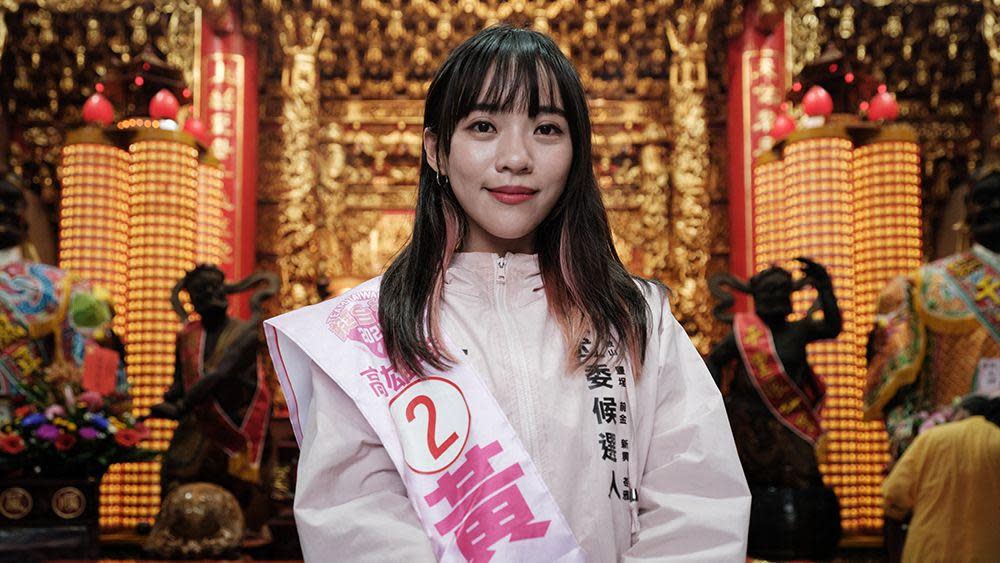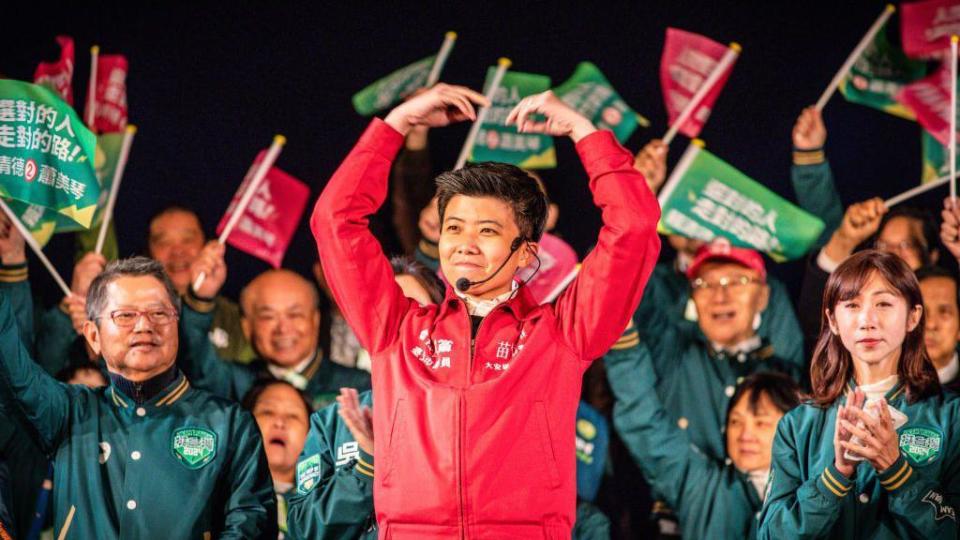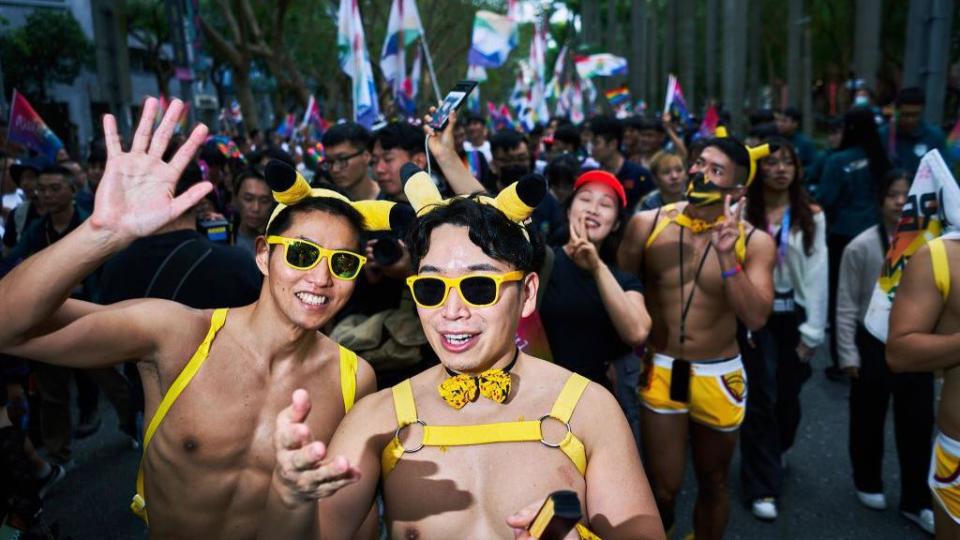Taiwan's gay politicians have broken ground - but their battle isn't over

Even in the exuberant world of Taiwanese politics, Huang Jie stands out - and not just because of the pink highlights in her hair and love for cosplay.
Known for her fiery speeches and progressive views, the 31-year-old made history in January when she won a seat in parliament - and became the island’s first openly gay legislator.
“I think it's a new milestone for Taiwan,” Ms Huang told the BBC recently. “I feel quite grateful that the Taiwanese are willing to have come this far.”
“Of course, as the first such legislator, I also bear a certain responsibility, which is to work harder and show everyone my efforts in pushing for LGBTQ rights,” she added.
Taiwan is one of the most progressive place in Asia for gay rights. Back in 2019 it was the first place in the region to legalise same-sex marriage. Now it also recognises transnational LGBTQ+ couples and allows gay couples to adopt.
Besides Ms Huang, activists estimate there are now more than a dozen Taiwanese politicians who identify as LGBTQ+.
They include lesbian Taipei city councillor Miao Poya - she and Ms Huang were the two most prominent gay politicians in January’s elections. The island - and the world - also had its first transgender cabinet minister back in 2016, when then President Tsai Ing-wen appointed Audrey Tang as digital affairs minister.
Yet some worry of a resurgence in conservative politics - while others dream of a time when sexuality will not even be a point of discussion.
Ms Huang’s win - she represents the governing Democratic Progressive Party in its stronghold Kaohsiung - caps a rocky few years in her political career. After brief stints in environmental health research and journalism, she joined a small progressive political party and in 2018 won a seat in Kaohsiung’s local council.
The following year, she shot to fame when she went toe-to-toe with controversial conservative politician Han Kuo-yu. During a sparring session at a council meeting, she was caught on camera rolling her eyes before delivering a snappy riposte.
That moment of unbridled exasperation earned her the delighted attention of the Taiwanese internet, the moniker “eyeroll goddess”, and a new following. But it also attracted scrutiny. A tabloid ran a piece about her romantic life, prompting Ms Huang to deny some of its allegations and clarify that she was bisexual.
She said she was forcibly outed by the press – her parents had no idea about her sexuality until they read about it in the papers. Given a choice, she would not have revealed it.
“I have never shied away from talking about my sexual orientation. But I also don't think I have the obligation to explain my sexual orientation in particular,” she said. “When we have to show that I am a sexual minority, it conveys to society that gay people are the exception, special, and not normal.”
Ms Huang has since come to terms with her role as an openly gay public figure, and has spoken about her experience in interviews.
She has also made clear she would push for LGBTQ equality in parliament. One of her top priorities, she told the BBC, is to advocate for same-sex couples to have biological children. Taiwan is now considering allowing them access to assisted reproductive technology such as IVF.
But as the only gay person in Taiwan’s famously combative parliament - which now happens to be led by the target of her famed eyeroll Mr Han - Ms Huang also anticipates critics “may use my sexual orientation and identity against me”.
“I can already think of scenarios where, if my performance is not as good as they expected, they will say it’s because I’m a gay legislator… it is a common situation that sexual minority public figures face.”
It is an example, she said, of a “social environment that is not friendly enough”. This is why “even in Taiwan, where everyone feels that gay people are already very open, in fact there are still many public figures or people in charge who are still very afraid to reveal their identity.”
Ms Huang pointed out that unlike her straight counterparts who often appear publicly with their partners, she appears alone. Her partner is afraid of accompanying her “because they feel they have to bear a negative gaze”.
Other LGBTQ politicians also said they have faced hurdles.

When Ms Miao first started out in politics, she told the BBC she was advised by senior party members to “play down my gay identity”. They suggested she grow her hair long and use more pink campaign materials. She refused.
The challenge, Ms Miao said, lies in convincing voters to view her as more than just her sexual preferences: “Once you disclose your identity, then the voter’s perception of you will be focused on your sexual orientation… to put it simply, you will be labelled.”
It is a subtle battle in a society which has seemingly embraced the LGBTQ community.
Taiwan used to be deeply split on gay rights, but government polls show a rise in support in the last five years. About 69% are now in favour of same-sex marriage while some 77% support same-sex adoption.
Tens of thousands attend Taiwan’s annual pride parade, the biggest in Asia. Even more gay tourists flock to its capital all year round for its vibrant LGBTQ scene, earning Taipei the nickname “the San Francisco of the East”.
In May, Taiwanese drag queen Nymphia Wind who won popular reality show Rupaul’s Drag Race was hosted by then-President Tsai Ing-wen at her office - a sign not just of recognition, but also acceptance.
While Taiwan’s government has led the way, there are still some parts of society that are not as accepting, say observers. Though attitudes especially among younger parents are changing, “in Taiwanese society, we think it’s okay if other kids are LGBTQ - but not mine,” said Liu Wen, an associate fellow with Academia Sinica who studies queer issues in Chinese-speaking communities.
Some fear that the lingering conservatism could bloom following the recent election. “I’m not 100% optimistic we will continue to become even more progressive… we cannot be complacent because we do see conservative ideology rising,” said Rita Jhang, an academic and activist with LGBTQ group Taiwan Tongzhi Hotline Association.
Joyce Teng, executive director of Taiwan Equality Campaign, said the issue of homosexuality “can still be manipulated by conservative political powers”.
During the election a candidate from the up-and-coming Taiwan People’s Party (TPP) questioned Ms Miao’s appearance and gender presentation. Separately, a small party campaigned on an anti-transgender platform while a conservative group warned against voting in LGBTQ lawmakers.
Ko Wen-je, the leader of TPP, who enjoyed a lot of youth support in January's election, has been criticised for remarks appearing to frame homosexuality as a psychological issue. He also expressed shifting views on same-sex marriage and was accused of flip-flopping on the issue to gain votes. Mr Ko insists he never opposed it.
One possible reason conservative attitudes are rising again is the progress Taiwan has made. Ms Miao said: “It is precisely because of this… that some opposition opinions will become more intense.”
But she hopes that Taiwan's democracy can overcome this. “Taiwanese society is very diverse – extremely open and extremely conservative views can co-exist.”

Could Taiwan one day have a gay president – and become the first place in Asia to have a leader who is out?
Some hope this becomes an irrelevant question. “What I hope is that in the future, Taiwanese voters will not consider personal identity, such as whether they are a boy or a girl, or whether they are heterosexual, as a key deciding factor when choosing a president,” Ms Miao said.
Ms Huang agreed. Since taking office she has championed a variety of issues, and not just LGBTQ rights. She has led recent protests over parliamentary reforms, and also chairs a parliamentary group building links with Hong Kong as China tightens its control over the city.
Her aim, she said, is to show “I am not different from everyone else, I can still work hard in the public sphere and gain recognition for my performance.”
She dreams of a Taiwan where “there would be no so-called glass ceiling - nor would I even feel like I’ve hit a wall everywhere because of my identity”.
Additional reporting by Joy Chiang.


